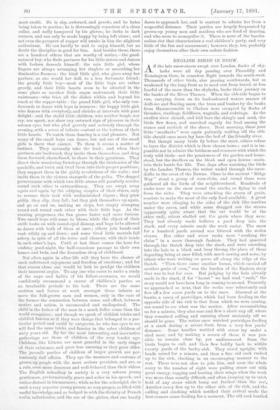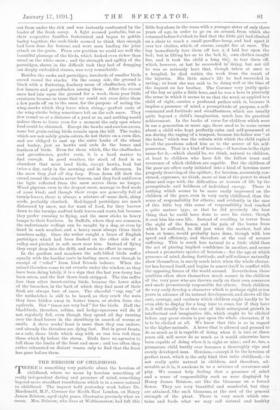ENGLISH BIRDS IN SNOW.
AS the late snow-storm swept over London, flocks of sky- larks were all day passing over Piccadilly and Kensington Gore, in ceaseless flight towards the south-west. Thousands of other birds, also passing southwards, but so weakened by the long frost as to need rest from travel, or less fearful of the snow than the skylarks, broke their journey on the banks of the River Thames. When the ebb-tide began to run, carrying down on its lead-coloured waters masses of drift-ice and floating snow, the trees and bushes by the banks from Hammersmith to Chelsea were occupied by flocks of thrushes, starlings, fieldfares, wagtails, and redwings. As the swollen river shrank, and laid bare the shingle and mud, 'the birds flew down, and searched eagerly for food among the stones and rubbish of the shore. Next morning, these poor little " mudlarks" were again patiently waiting till the ebb- tide should once more lay bare the bed of the friendly river. But though many birds fly before the snow, others refuse to leave the district which is their chosen home ; and it is im- possible not to admire the boldness and resource with which the truly wild birds—not the pensioners of the garden and home- stead, but the dwellers on the bleak and open downs—main- tain their battle for life. Two days after watching the birds by the London Thames, the writer waded through the snow- drifts to the crest of the Downs. Close to the ancient " Ridge Way" stood a group of corn-ricks, and round these were gathered all the birds of the neighbourhood. Hundreds of rooks were on the snow round the stacks, or flying to and from the ricks. They were attacking the stores of grain, resolute to make the most of the only food available. A great number were clinging to the sides of the rick like martins under the eaves, and while some dragged out the straws (apparently quite aware that the ear would be at the other end), others shelled out the grain where they were. They had already made hollows a yard deep into the stack, and every minute made the work easier. The snow for a hundred yards around was littered with the stolen straws. But other and wiser rooks were "working the claim" in a more thorough fashion. They had quarried through the thatch deep into the stack, and were crowding into the hole in a black and busy throng, the place of those departing being at once filled, with much cawing and noise, by others who were waiting en queue all along the ridge of the thatch. " Then there came another locust, which carried off another grain of corn," was the burden of the Eastern story that was to last for ever. But judging by the hole already made in the stack, if for "locust" we had read "rook," the story would not have been long in coming to an end. Presently we approached so near, that the rooks rose reluctantly and flew off a few score yards on to the snow. Alarmed at the • bustle, a covey of partridges, which had been feeding on the opposite side of the rick to that from which we were coming, ran round to see what was the matter. After reconnoitring us for a minute, they also rose and flew a short way off, where they remained calling and running about anxiously till we should be gone. The writer once watched partridges feeding at a stack during a severe frost, from a very few yards' distance. Some hurdles wattled with straw lay under a shed near, and by making a screen of these it was pos- sible to remain close by, yet undiscovered. Soon the birds began to call, and then flew boldly back to within twenty yards of the barley-rick. They stood upright, with heads raised for a minute, and then a fine old cock rushed up to the rick, clucking in an encouraging manner to the rest. These were not slow to join him, and soon the whole covey to the number of eight were pulling straw out with great energy, tugging and beating their wings when the work was more than usually difficult, and often jumping up to latch hold of any straw which hung out further than the rest, Another covey flew up to the other side of the rick, and the calling and clucking which notified their arrival made the first-comers cease feeding for a moment. The old cock bustled
.out from under the rick and was instantly confronted by the leader of the fresh covey. A fight seemed probable, but as their respective families fraternised and began to gobble barley together, the cock-birds seemed to think that enough had been done for honour, and were soon leading the joint attack on the grain. From our position we could see well the :beautiful plumage of the birds, which looked even richer than usual on the white snow ; and the strength and agility of the .partridges, shown in the difficult task they had of dragging out deeply embedded straws, was very remarkable.
Besides the rooks and partridges, hundreds of smaller birds .crowd round the stacks. On the sunny side, the ground is black with a fluttering, feathery mass of chaffinches, with a few linnets and greenfinches among them. After the recent snow had lain upon the ground for a week, these poor little creatures became so tame that we could not even drive them a few yards off on to the snow, for the purpose of noting the wing-marks which they leave when rising,—perfect casts of the wing-stroke being sometimes left on the soft snow. They flew round us at a distance of a yard or so, and nothing would induce them to leave even for a moment the only spot where food could be obtained. Except the hawks and carrion-crows, none but grain-eating birds remain upon the hill. The rookS, which are not solely grain-eaters, do not thrive on a corn diet, and are obliged to cast up the outer busks of the wheat and barley, just as hawks and owls do the bones and feathers of birds. Even for those which, like the chaffinches and greenfinches, prefer corn, it is a hard matter to find enough. In good weather, the stock of food is so abundant that most land birds, except hawks, feed but twice a day, early in the morning and in the afternoon. In the snow they feed all day long. From dawn till dark the .crowd round the stacks never lessens, and they feed until even the light reflected from the snow serves them no longer. Wood pigeons, even in the deepest snow, manage to find seeds of some kind; and though their crops are generally full of turnip-leaves, there is always a mixture of • some dark, shiny .seeds, probably charlock. Red-legged partridges are much distressed by snow, not for want of food, for they burrow down to the turnips and•eat both leaves and roots, but because they prefer running to flying, and the snow sticks in heavy lumps to their feathers. In Suffolk, where they are common, the unfortunate redlegs can be caught by a dog, or even by hand in such weather, and a heavy snow always thins their numbers sadly. Once the writer caught a brace of English -partridges which had been flushed on the other side of a valley and pitched in soft snow near him, Instead of flying they crept deep into the drift, and made no effort to escape.
In the gardens and meadows the soft-billed birds suffer equally with the hardier sorts in lasting snow, even though in xeceipt of " relief " from kind friends indoors. When the niissel-thrushes come to eat crumbs under the window, as they have been doing lately, it is a sign that the last yew-berry has been eaten, and the last thorn-bush stripped. The tits suffer less than other insect-eating birds, because the lower sides of the branches, in the bark of which they find most of their .food, are always bare of snow. The cheerful "rap, rap," of the nuthatches is still to be heard, as they crack the nuts they have hidden away in better times, or stolen from the squirrels. But " times are very bad" for the birds. Half the :blackbirds, thrushes, robins, and hedge-sparrows will die if not, regularly fed, even though they spend all day turning over the dead leaves in the shrubbery in search of worms or -snails. A three weeks' frost is more than they can endure, and already the thrushes are dying fast. But in great frosts, .as a rule, those birds which stay with us run less risk than those which fly before the storm. Birds have no agencies to tell them the limits of the frost and snow ; and too often they arrive exhausted on distant coasts only to find that the frost has gone before them.







































 Previous page
Previous page